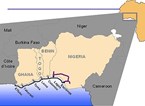West African Gas Pipeline Approved, Set to Go Online by 2002


The participants in the international consortium are: Chevron Nigeria Ltd.; Ghana National Petroleum Corp.; Nigerian National Petroleum Corp.; Shell Production Development Co. of Nigeria Ltd.; Societe Beninoise de Gaz SA; and Societe Togolaise de Gaz SA.
The ministers of energy from the four African nations witnessed the signing, as well as M. Lansana Kouyate, General Secretary of the Economic Community of West African States (ECOWAS); Calvin Humphrey, US Assistant Secretary of Energy; Dick Matzke, a director of Chevron Corp. and president of Chevron Overseas Petroleum Inc.; and George Kirkland, chairman and managing director of Chevron Nigeria Ltd.
"This agreement demonstrates that when stakeholders become partners, challenging and complex projects such as the WAGP can be accomplished," Matzke during the signing ceremony. "We are now poised to bring this project to reality by 2002.
"One of the most exciting aspects of this project," Matzke continued, "is that it ties together people, economies, and nations to benefit the huge region of sub-Saharan Africa. It is our hope that the vision of unprecedented economic growth and enhanced stability resulting from the benefits created by this project can be realized."
The pipeline, which is expected to cost US$400 million, will initially ship about 120 million cf/d of Nigerian gas for sale to power generation customers in Ghana, Togo, and Benin. Volumes may double or triple over the life of the project as markets grow and existing industries convert to gas.
In addition to bringing much needed energy to this part of the African continent, it is envisioned that the project will make a significant contribution to the economies of the participating nations. Studies have shown that WAGP will create thousands of direct and indirect jobs in the four countries by providing reliable, low-cost fuel for industrial and commercial development. In addition, the WAGP will have a permanent impact on the environment via its 100-million-ton reduction of greenhouse gases.
Commenting on the project's environment benefits, Kirkland said, "First, diminished flaring of natural gas will reduce the amount of greenhouse gas emissions. Second, the availability of natural gas for power generation will reduce the need to use less environmentally friendly fuels, further decreasing air pollutants. Indeed, it is because of these benefits, we believe, that WAGP could qualify as one of the world's first Clean Development Mechanism projects under the Kyoto Protocol.
"The WAGP also dovetails perfectly with Chevron's phased Escravos Gas Project (EGP), which exemplifies our commitment to commercialize the vast natural gas resources of Nigeria," Kirkland continued. "Coupled with domestic Nigerian gas sales from EGP Phase One, a planned cutting-edge gas-to-liquids facility fueled from EGP Phase Three, and the gas supplied by Phase Two for WAGP, Chevron is working hard to maximize the value of petroleum resources for its partners."
